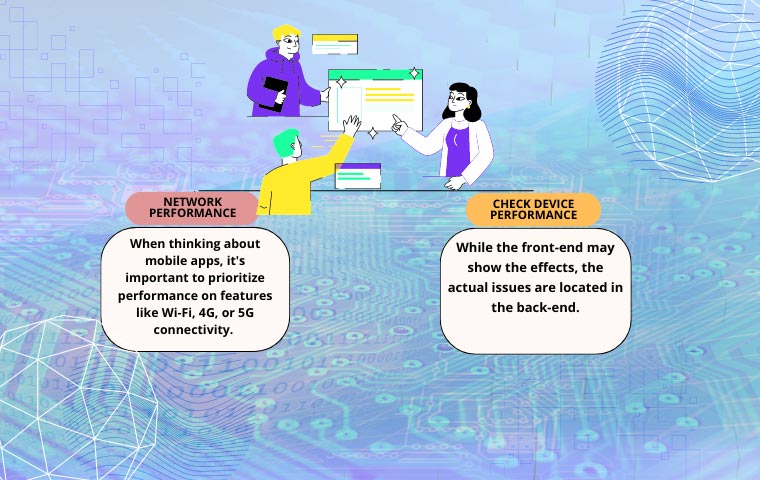The success of your application is connected to your mobile app performance. With millions of apps available in 6.84 billion smartphones; this factor shows users will nearly always check out the app reviews before making a decision about whether or not to download the app.
We know user experience and design matters but the truth is the success full mobile app is all about end-to-end performance. Let’s dig more about it.
What Is Mobile App Performance?
Launch and load times, app size, frame rate, compression, and other factors all contribute to app performance.
It’s critical to optimize these aspects of app performance as soon as possible in order to improve the user experience, and teams may make a difference by focusing on a few approaches.

When discussing app performance, we are not only referring to key performance indicators (KPIs), but also overall performance.
Some factors to consider are the energy consumption of your app, the loading time, and how quickly it responds to user actions. In other words, experience optimal efficiency with mobile app performance.
Imagine this situation: You forgot to grab your coffee before leaving the house. In the past, you have been hesitant to use delivery or food apps due to privacy concerns. Today, you decide to take a risk and download a popular coffee shop app.
This way, you can conveniently place your order on your phone and pick it up at the drive-thru, just like they show in their commercials.
I have a problem: the app takes a really long time to load, even longer than waiting for your coffee to brew or standing in line at the store. Most people, especially when they haven’t had their coffee, will give up on using a slow app and never use it again.
In this situation, application performance can be compared to a successful app launch and you feeling energized from having a cup of coffee.
However, performance is not only about the time it takes for your app to launch initially. It also includes how well your app functions, how quickly its systems load, and how it responds to user interactions.
Why Mobile App Performance Is Important?
Around 70% of mobile app users tend to give up on using an app if it takes too much time to load. Did you know that even a one-second delay in response can lead to a 7% decrease in conversion rates?
It’s also interesting to note that almost half of all apps are uninstalled within the first month of being downloaded.

The performance of an app is crucial for its success because it directly affects how long users will use it and whether they will keep using it.
Let’s imagine our user who is not a big fan of caffeine had a quick initial loading time and is now smoothly navigating through the app. When our user tries to order their drink by clicking, nothing happens. Actually, it takes the app a full 10 seconds to provide the user with options for size and sweetener.
The user may not be aware of this because they have already left the app. Although the example above is just for illustration purposes, studies indicate that 40% of users tend to switch to a competitor if they have a negative experience with a mobile app or website. Simply put, when an app performs poorly, users not only stop using it but also turn to competitors to find solutions for their problems.
Here Are Some Tips To Enhance The Performance Of Your App
We know performance is not defined only by the UX design. Considering both sides of the backend and front end in app development brings you optimal performance. Remember the user who didn’t have any coffee and tried out an app that ended up not working because it couldn’t load.

Imagine that the app has finished loading and the user has been able to navigate smoothly until they reached the point of making a payment. If an app stops working when many people are using it, that’s a problem with how well it performs.
Performance problems can include issues such as slow app loading, app crashes, and problems with certain features like checkout. There are many factors that can affect app performance. Mobile app performance is about granting user expectation, and delightful usability with perfect combination design.
It is true that if an app doesn’t provide a good user experience, it could be due to issues like slow data loading or image problems. However, there are other factors that can affect an app’s performance as well.
To optimize your mobile app, it’s important to ensure that both your system and device are running at their best performance levels. To help you make your mobile app run better, here are some tips for your system and device:
Check Device Connectivity

Improve network speeds and make applications respond faster. Whether you’re a coffee lover or not, most people have very little patience when it comes to slow launch or load times. Developers should make sure that their apps can work on different networks to avoid any problems that could negatively impact the user experience.
Great news! There are a few ways you can quickly enhance the performance of your app:
Please minimize the amount of URL redirects on your screens.
Are you still using Flash? Stop. Please help me find a mobile-friendly option that is better than what I currently have.
If the response time of the server is slow, it will make your app slow as well. The easiest way to prevent this issue is to steer clear of using free or insufficient hosting services that provide little to no support. One simple solution is to invest in a high-performance server that can help prevent these types of issues.
Using a native database ensures that your data remains safe even if a server experiences downtime. In addition, having a backup server means that your app will still be accessible to users even if the main server is not working. This helps to maintain the fast launch and load speeds that users are used to.

Consider the experiences of our possible users and the ups and downs they faced from the effects of caffeine while using our fictional app. An app crash is the worst outcome for front-end performance.
The most effective approach is to regularly assess, gather, and handle the data related to the following:
- What percentage of users experience a crash within a specific time frame?
- How frequently does the app crash within a specific time frame?
- I would like to know the rates at which hang time occurs and the frequency of encountering failed network errors.
Before we dive into front-end considerations and data collection, let’s take a moment to pause and reflect. When developing the back-end of an app, it’s important for developers to keep in mind the main cause of app crashes:
- The number of requests the app needs to make to a server in order to fulfill a user’s request. When there are many requests, it increases the chances of an app slowing down and crashing.
- The less requests you receive – you understand what I mean.
To make things easier, you can fix the back end by reducing and limiting the number of calls and requests your app makes to the server.
It’s important to remember this during the development process and gather crash data from user experience (UX) to prevent crashes. This shows the connection between the front-end and back-end of mobile app development.
Check Device Performance
While the front end has the main role of showing the final outcome the roots of performance is in the backend.
If you’re experiencing issues with apps that are buggy, glitchy, and draining your device’s memory and battery life, it’s important to prioritize optimizing them. However, it’s also worth considering evaluating your device as a starting point.

Improve The Speed At Which The Screen Is Displayed
Yes, users value fast performance, but what happens if an app doesn’t display properly? How soon can users start using and interacting with the app or page? What’s the use of launching the app and loading pages if the user can’t interact and engage with it?
As developers, it’s important to keep the following things in mind:
- Can the app display properly on different operating systems like Apple and Android, as well as different screen sizes? Keep in mind that the content you create for a desktop screen may not look good on a mobile screen. When creating an app, it’s important to scale images properly so that users don’t have to zoom in or out.
- How do image and font sizes compare in terms of consistency? One simple way to improve screen rendering times is by ensuring consistency. By keeping the font and image sizes consistent, the app prevents any issues with resizing the screen while scrolling. This ensures that users can start using the app right away without any delays.
Reduce The Use Of Battery And Memory
Memory and battery life are critical parts for mobile users. Because of this, your UX will improve if your software consumes less memory and uses less energy.

Some Things to Think About
A couple of examples of things that can affect memory use are
- memory leaks
- push notifications.
Constant use of an app can quickly deplete battery life, therefore it’s important to think about potential power drains before release. Instead, you might consider including a notification reminding users to disable their device’s location services and wireless connections when they are not in use.
When designing an app, it’s important to focus on both the front and back ends. Each time the app failed our coffee-seeking users, it was because of something happening behind the scenes.
What Is Mobile App Performance Testing?
Performance testing is a kind of non-functional software testing that measures an application’s robustness in terms of its speed, scalability, and responsiveness under stress.
Unfortunately, it is typically considered as an afterthought, done in isolation, and started after functional testing is finished and, in most cases, after the code is ready to release, despite its central role in guaranteeing software quality.
Some of the things you may check off your list while performing performance testing are: how much data an app generates, how fast it transfers data, how much bandwidth it consumes, how many users can access it at once, how well it uses memory, how efficiently it handles its workload, and how quickly it responds to commands.
Enhancing Mobile App Performance with Predictive Analytics
Predictive analytics plays a vital role in optimizing mobile app performance. By leveraging advanced algorithms and data analysis techniques, predictive analytics enables app developers and performance testers to anticipate potential issues, identify performance bottlenecks, and proactively address them before they impact the user experience.
Through the analysis of historical data, user patterns, and system behavior, predictive analytics can forecast the expected performance of a mobile app under various conditions, helping developers fine-tune their applications for optimal responsiveness, stability, and resource utilization.
By incorporating predictive analytics into the mobile app development and testing process, organizations can enhance user satisfaction, reduce app crashes, and ensure a seamless and high-performing experience for their users.
Frequently Asked Questions
What is meant by performance in mobile applications?
Indicators of your app’s performance include its responsiveness, startup time, memory and power consumption, and, in the case of an animation or game, its frame rate or the smoothness of the animation’s or game’s behavior.
How to measure mobile application performance?
Key performance indicators (KPIs) for apps include load time, crash reports, and device data (including screen resolution and operating system). With these controls, you may manage the app’s technical performance and improve the testing process.
Conclusion
The mobile app performance is critical to providing a great user experience and guaranteeing the success of mobile applications. A good app is distinguished by its speed, responsiveness, stability, and efficiency.
Users expect apps to load quickly, respond swiftly to their inputs, deliver fluid and seamless interactions, use as few device resources as possible, and run consistently without crashes or freezes. Thecyberiatech is here to build you a seamless app with







